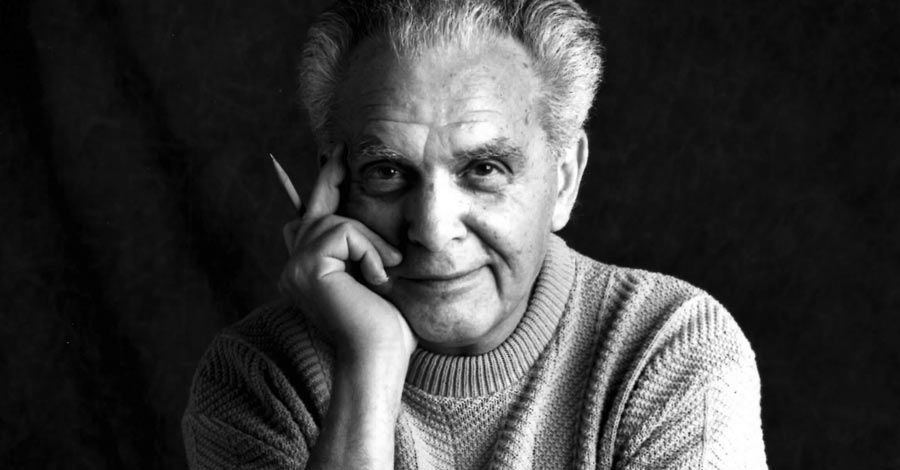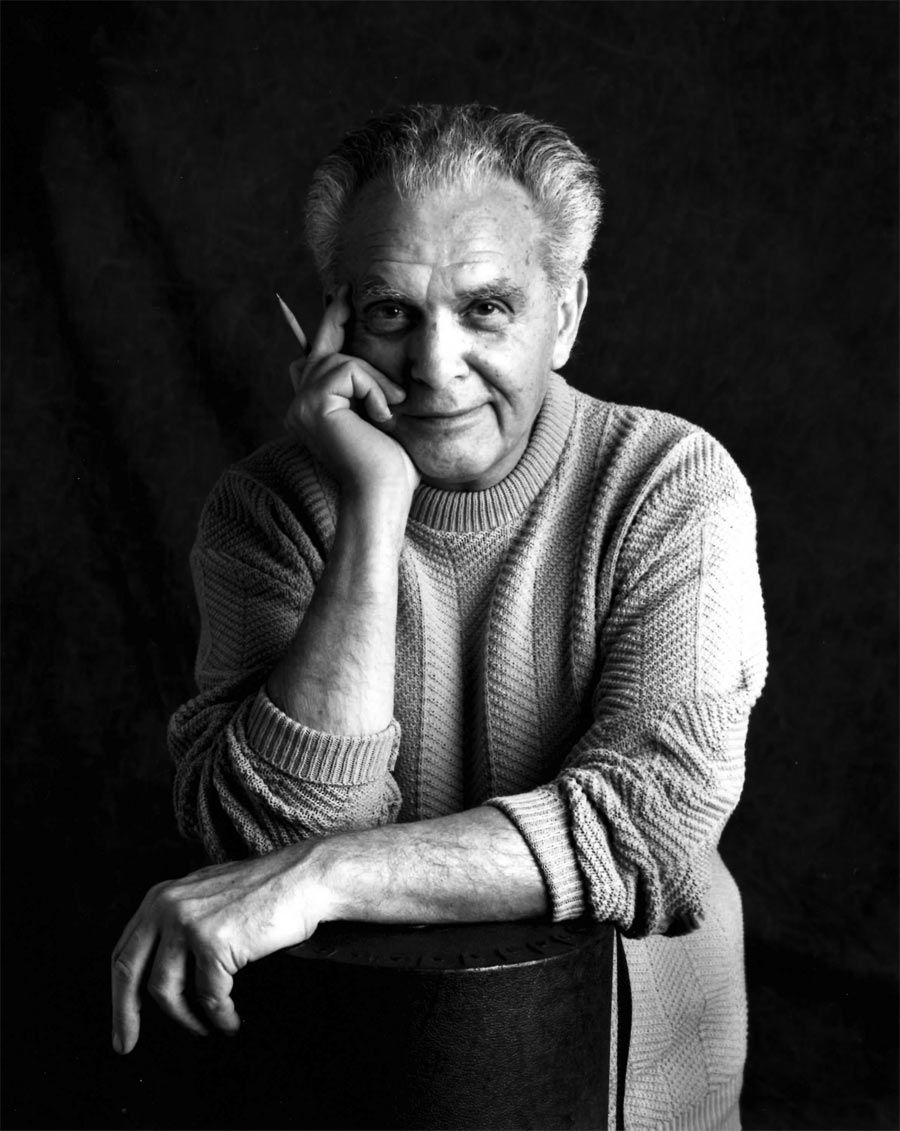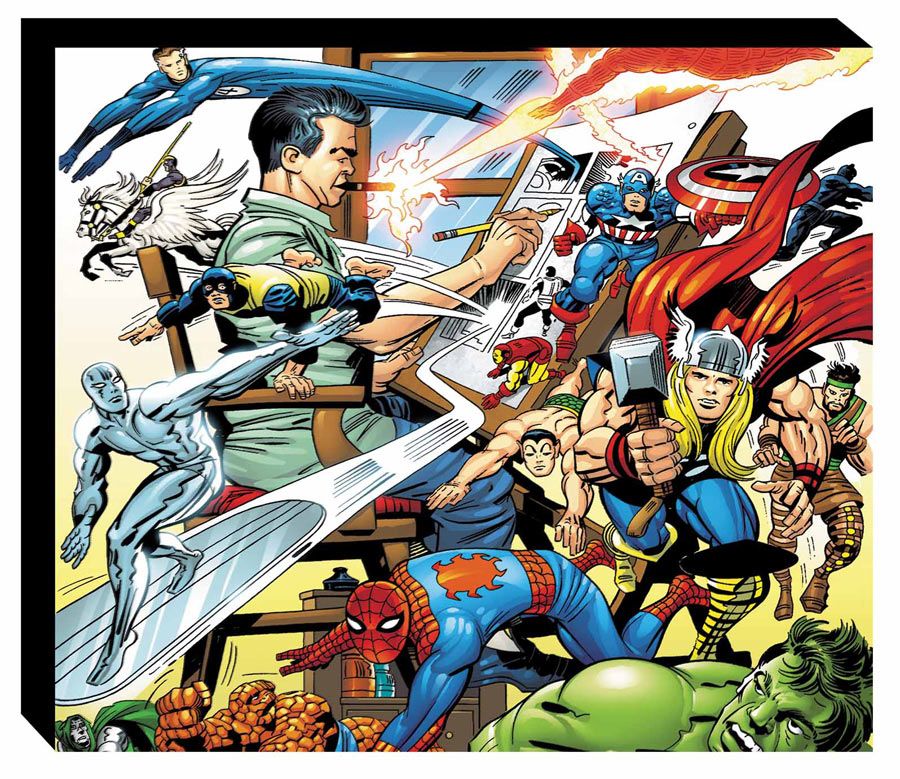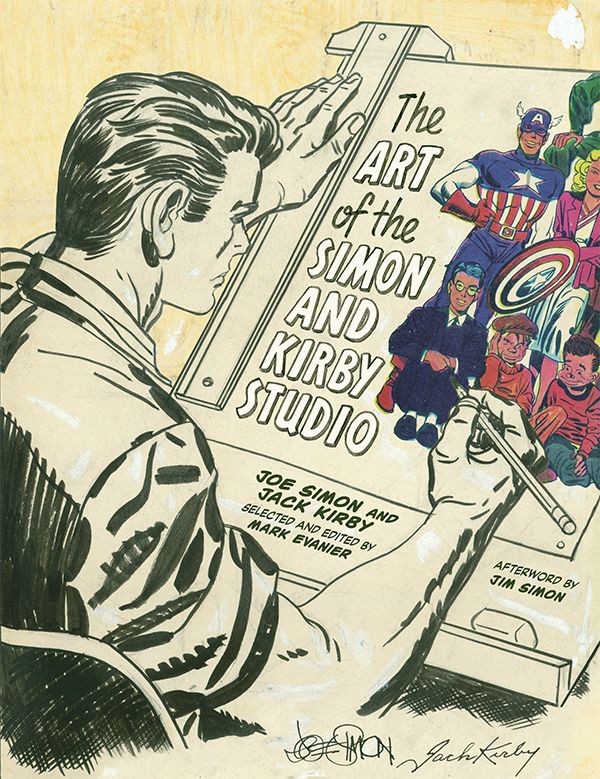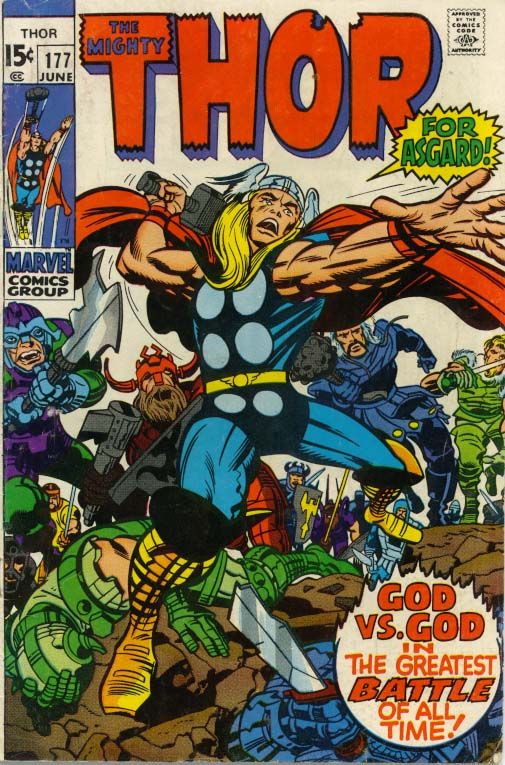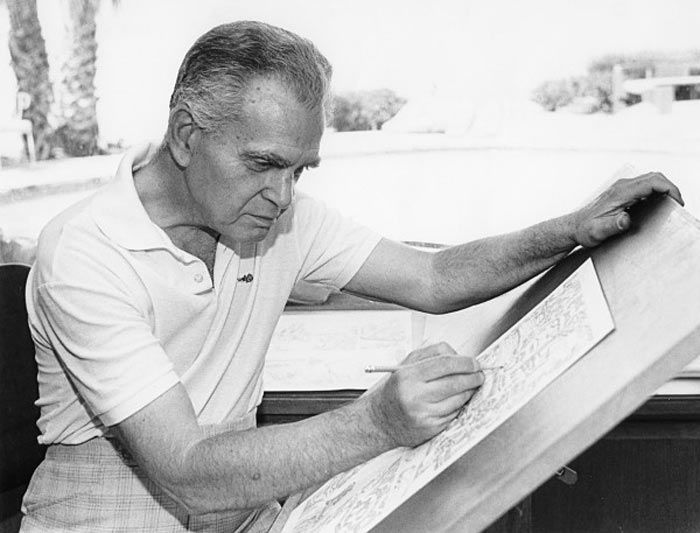NOTE: The original version of this report misattributed a quote about Jack Kirby's work ethic to Neal Adams. It has been edited to properly attribute it to Mark Evanier, and to provide a fuller quote.
A huge WonderCon 2015 crowd waited in lines separated by tape on carpet to see a tribute to one of the biggest names in comics. They were well rewarded when the stellar panel, moderated by writer and Jack Kirby's longtime friend Mark Evanier, arrived. For an hour, Paul S. Levine (attorney for the Roslyn Kirby Trust), playwright Crystal Skillman, comic book writer Fred Van Lente, Eisner Award winner Darwyn Cooke, and comics legends Len Wein and Neal Adams (the latter arrived late but made up for it in spades) shared tales of the King.
"That was Kirby Crackle, folks!" Evanier quipped, the the sound system humming and popping as he took the mic. "We got a good turnout for a Sunday afternoon. This is one of my stock things I say: Every day of my life, I find myself answering questions about Jack, thinking about Jack, talking about Jack. His mind would race from topic to topic. He'd put strange associations together. A lot of the great concepts he came up with in comics were a case of him putting together things no one ever thought of. We do these panels to talk about Jack."
Evanier made one thing clear: the panel was not going to discuss details about the longstanding, recently settled legal dispute between Marvel Comics and the Kirby estate. "I felt Jack was not properly compensated, he was not properly credited. Everyone who knew the history of Marvel Comics felt this way. I cannot tell you the relief I have felt to have closure."
Skillman and Van Lente first discussed a stage play about Kirby they wrote together, called "King Kirby." "I primarily write comics for a living," Van Lente explained. "Before I broke in, I became interested in Jack's life and was researching a biography of him as a hobby. I was dating this lovely lady at the time," he said, motioning towards Skillman. "We subsequently got married. She was a playwright and, as a 'monkey see, monkey do' thing, I adapted my research as a play. We did a reading and kind of put it on the shelf."
"There's a movement called 'geek theatre' or 'comic book theatre,'" Slimman added, noting that the idea of a play about one of comics' strongest voices was very attractive to a number of elements of the New York theatre community. "King Kirby" was produced for a festival in Brooklyn, with an audience equally split between comics fans and neophytes.
"It's gonna be in Seattle and Calgary next year," Van Lente said.
At this point, Neal Adams walked in;Cooke stood and pulled out a chair for the iconic artist. Once Adams was settled, Van Lente continued his story. "Jack was a very physical type. We needed someone who was tough. There was one person we gravitated to, and we're lucky we got him."
"Steven Rattazzi," Skillman said. "He plays Dr. Orpheus on 'Venture Bros.' He did a great job showing some vulnerability. A lot of what we wanted to capture in the play was his struggle with his work, but also of his struggle with how he was perceived. We wanted to make sure we showed that."
"It's such a great kind of American story," Van Lente remarked. "We wanted to touch on that. A lot of people don't know pop culture is created by people. We really wanted to give that impression, to make people understand the human beings behind these big cultural icons."
"He dies -- spoiler alert!" Van Lente joked, discussing the play's story arc. "We start at Sotheby's, we start at the auction. He's at his drawing table, because he would never stop working. Some people, even very young, they were crying. To see someone who looked like him was very emotional. He starts saying, 'I don't want to hear the value when I'm gone.' In the end, it's there again, and he takes a piece of chalk from his pocket, just like how he used to draw on the sidewalk, and starts drawing on the stage."
Cooke noted that a similar project, a short film titled "Arty" based on Kirby's life, will premiering soon. "It's all about what he went through in the early part of his career. All over the world, there are people fascinated by his spirit. If you are in Halifax on April 20, catch the premiere."
Evanier took that opportunity to formally introduce Adams, who said, "I am the luckiest guy in the room. I'm doing a Superman/New Gods story for DC. Nobody else is."
Evanier expanded on Kirby's work ethic, and how he appreciated it when other creators brought their vision to the heroes and villains that had sprung from his imagination. "Over the years, when he heard somebody liked other artists more than his work, he was really non-competitive. The thing, though, that I think a lot of people never got about Jack was that Jack wasn't really competitive with most other comic book artists, because in his mind, they had a different job description. When John Buscema sat down to draw an issue of 'Fantastic Four' -- and, actually, nothing I'm about to say is knocking John Buscema in any way, or any of the artists I'm going to mention here -- his goal was to do an issue of the 'Fantastic Four.' When Jack sat down to do an issue of 'Fantastic Four,' in his mind his job description was to create a new universe, three spinoffs and take comics to another level"
Evanier tried to use this as a segue back to his point, saying, "The people who come after them always go back to the source material. There are creators always out to change comics a little bit with every job. Your Batman stories were not only self contained; you changed the character."
"I want to talk about Jack's influence," Adams continued, undeterred. "My thing with Jack, I imagine poor Stan Lee picking up pages from Jack and thinking, 'Asgard? Do I have to know all the gods of Asgard?' Going to the library to look up things that were second nature to Jack -- Stan had to go back and research this stuff, because Jack was ahead of everybody. You couldn't run to catch up to him because nobody knew where he was going. Holy -- jeez, what the hell is going on? He creates these worlds, where is this world?
"Then you read a comic, and there will be a double-page spread like a 'Mechanics Illustrated' thing pasted together," Adams continued. "Poor Stan would go, 'and heres Jack's view of the universe... 'nuff said!' Or he'd go, 'Excelsior!' and walk away. He didn't know what to do with it, because Jack was so incredible. Where did that damn little guy find the time? Letting fans into his house, eating his food, Roz taking care of him. Where did he have time to research this stuff? I'm a very knowledgeable person. I know sh--. You talk about any subject, Jack knew more than you knew. Imagine Stan. Stan is not what you>d call a tremendously educated person. He had to crack the books every time he opened a Jack Kirby story. That little guy behind that desk, chomping on the cigar, he was a genius. He set our business up, we all followed him."
To punctuate the point, Cooke addressed the crowd. "You're all holding Mother Boxes in your hand now."
Adams continued, saying DC treated Jack almost as badly as Marvel. Kirby had been lured away with promises of better treatment, but editor Carmine Infantino wanted Kirby to draw more like Curt Swan. When "New Gods" stories came in, "Carmine Infantino didn't get it. He'd say, 'You've gotta talk to Jack, get him to stop drawing square fingertips.' I can tell you, that's not gonna happen. I love Carmine Infantino, but he was a functioning illiterate. Just saying. He knew his own stuff; he didn't understand Jack at all. Putting Al Plastino Superman heads on Jack Kirby didn't make any sense. I told Carmine, 'I'll do the heads, let me do the patches.' This is ridiculous. I did it to save the work. They wanted that stuff changed. Of course people have square fingers in Jack's universe. It was Jack! It was wonderful. Jack went from Stan, who actually loved Jack and loved his work. Stan will always say lovely things about Jack..."
"Except under oath," Evanier interrupted.
Adams grimaced at that, but carried on. "He went over to DC Comics because he was told he would be treated better. Jack finally said, 'Enough with this crap,' and he went out to Hollywood. He calls me on the phone and he says, 'Neal, there's these kids calling me. They wanna publish my characters, and they'll pay whatever Marvel and DC pay, and they'll let me keep the rights to my characters. What is this bullsh--?' I told him, 'Everybody in the world thinks you're rich. If you admit what you get paid, fans and publishers would faint. Double your price, say you want to keep your characters and they will pay you.' 'Neal, they won't do that, it's bullsh--.' 'I promise you, Jack.' Sure enough, he did Captain Victory and it worked. Then two days later, I get a call from Sergio Aragones. He got a call from the same people. That's how Sergio has 'Groo the Barbarian' still. People think so much of Jack, so much of Sergio. They can't believe how they were treated. Jack had the ability to bite down, dig in, turn out four to six pages a day."
"Tragically, [I saw] the same thing Neal saw," Wein said of the DC Comics environment. "They would see the tiny little things that weren't to their satisfaction. If you wanted the house style, why in God's name would you hire a man who invented style?"
Evanier chimed in with a similar observation. "There was a tendency to out the DC touch on every book. Jack had a few allies up there. Another person who does not get credit is Nelson Bridwell who was a very brilliant man who was treated like Mel Cooley. He had a genuine love for comics that transcended any corporate considerations."
"Bridwell wrote a translation of 'Hamlet,'" Adams said. "It was the best translation I ever read in my life."
"It was all about appearance," Wein said. "They treated him very poorly."
"He was one of those people you'd go to," Adams said. "He was a big, big defender of Kirby's stuff. He had the most advanced ideas in comic books. Every time people try to do Jack Kirby stuff at DC, they fail. They keep doing their own version and not Jack's. Draw what Jack did, and it would be better. It's like 'Star Wars.' Finally, they got it. We're doing good, epic adventure on film. It just leapt ahead. That was like what Jack Kirby did. We're still trying to catch up. I can't jam all this sh-- into panels. The boom tube, it's a teleportation device, much better than 'Star Trek.' What a great idea! Of course it's a tube. He did all these ideas. We are lucky if we get anywhere close."
Evanier asked the relatively newer creators Van Lente and Cooke if they could believe these tales of terrible treatment, or if they were horrified by them.
"It's important to keep in mind, I worked in the music industry, the fashion industry and advertising, so of course I believe it," Cooke said. "Comics people live in a reality of their own, where they believe the world is a better place than it is. It's pretty commonplace outside of comics as well. Coming into it later, being 36, I'd had a very healthy dose. I found it very easy to believe. No less tragic, no less infuriating. Unfortunately, I have enough life experience to know this was no different."
Van Lente talked about Kirby's battles to have his original art returned and the difference in how artists are treated today. "My generation is very fortunate that a lot of that is a direct result of that struggle -- yet another reason we're grateful."
Cooke scoffed at modern artists bothered by deals they receive. "They'll have had something happen to them, and they're outraged. I look at them like, are you a f---ing idiot? If they're going to do it to Jack Kirby, who are you? They treated him horribly. Look at your place, have a sense of history."
"My only regret," Levine interjected, "is that I wasn't born 30 years earlier. Who known what could have been if he was properly represented back then?"
"They probably wouldn't talk to you," Evanier said. "They were like, 'We don't talk to lawyers. We only talk to artists,' which is not the way business should be done."
"Well," Adams said, "lawyers..."
"Can you imagine a world without lawyers?" Cooke asked before thinking about what he was saying. "Ugh, I'm gonna get sued."
Wein shifted the discussion to a more upbeat topic, talking about Kirby's home. "It was like going to Candy Land," he recalled. "Marv Wolfman and I..."
"Jerks, the both of 'em," Adams grunted. "Precocious jerks!"
Wein continued unabated, discussing how Wolfman and he as preteens went through a series of secondaries like Frank Giacoia, who eventually introduced them to Kirby.
"To get rid of you!" Adams barked.
"That's what they all did," Wein admitted. "The place was astonishing. Several of those two-page spreads from Boys Ranch, they were on the wall. They'd treat us like family. We'd come over once a month and just watch Jack work. Roz would treat us like her kids. She'd come down and bring us milk and cookies. They were the most remarkable family. We became lifelong friends, it was wonderful. Everybody else said, 'Oh, pests,' but Jack wanted to know what we thought. He was always looking for information, always trying to find new focus, things to work on. I get to carry to my grave that I was Jack's friend."
Evanier remarked on the renewing of vows at the Kirbys' 50th anniversary. "He was very weak, like when you have chemotherapy," the writer recalled. "He came to me and said, 'I have to sign some papers later, just in case... can you still do my signature?' During the ceremony the rabbi asks, 'Do you take this man?' and she's like, 'I'm thinking it over.' Jack couldn't have found his way to the drawing table without Roz. She'd make him go outside for air that wasn't befouled by cigar smoke."
Cooke, talking about how Adams defended Kirby, said, "Neal was the conscience of DC Comics. He was the guy who got them to stop tearing up art."
"It had a lasting effect," Evanier said. "Neal forced them to do business better ways."

